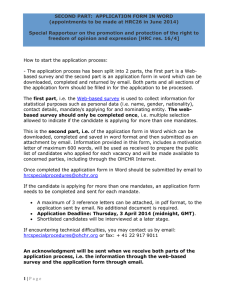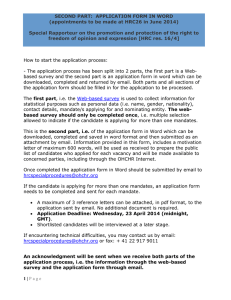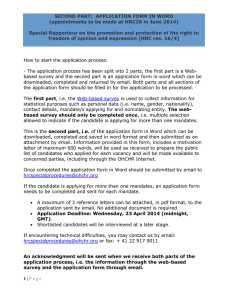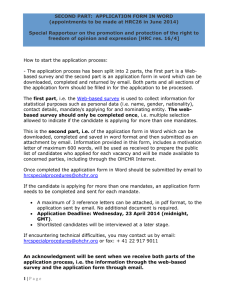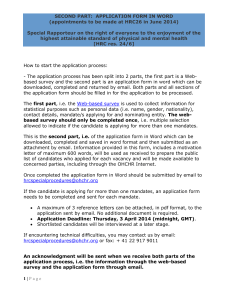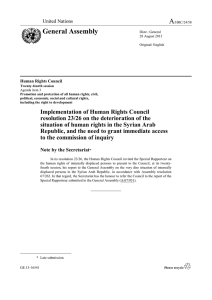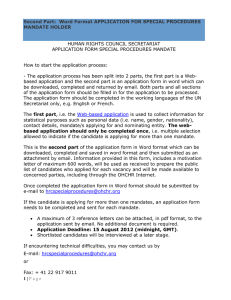SECOND PART: APPLICATION FORM IN WORD
advertisement
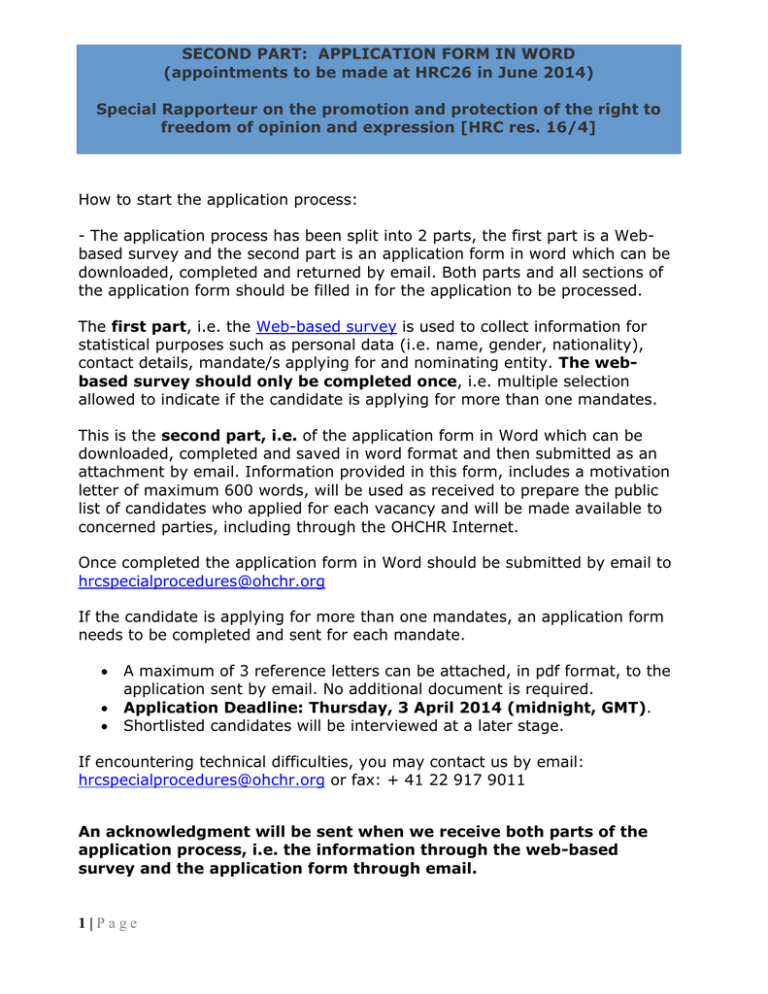
SECOND PART: APPLICATION FORM IN WORD (appointments to be made at HRC26 in June 2014) Special Rapporteur on the promotion and protection of the right to freedom of opinion and expression [HRC res. 16/4] How to start the application process: - The application process has been split into 2 parts, the first part is a Webbased survey and the second part is an application form in word which can be downloaded, completed and returned by email. Both parts and all sections of the application form should be filled in for the application to be processed. The first part, i.e. the Web-based survey is used to collect information for statistical purposes such as personal data (i.e. name, gender, nationality), contact details, mandate/s applying for and nominating entity. The webbased survey should only be completed once, i.e. multiple selection allowed to indicate if the candidate is applying for more than one mandates. This is the second part, i.e. of the application form in Word which can be downloaded, completed and saved in word format and then submitted as an attachment by email. Information provided in this form, includes a motivation letter of maximum 600 words, will be used as received to prepare the public list of candidates who applied for each vacancy and will be made available to concerned parties, including through the OHCHR Internet. Once completed the application form in Word should be submitted by email to hrcspecialprocedures@ohchr.org If the candidate is applying for more than one mandates, an application form needs to be completed and sent for each mandate. A maximum of 3 reference letters can be attached, in pdf format, to the application sent by email. No additional document is required. Application Deadline: Thursday, 3 April 2014 (midnight, GMT). Shortlisted candidates will be interviewed at a later stage. If encountering technical difficulties, you may contact us by email: hrcspecialprocedures@ohchr.org or fax: + 41 22 917 9011 An acknowledgment will be sent when we receive both parts of the application process, i.e. the information through the web-based survey and the application form through email. 1|Page SECOND PART: APPLICATION FORM IN WORD (appointments to be made at HRC26 in June 2014) Special Rapporteur on the promotion and protection of the right to freedom of opinion and expression [HRC res. 16/4] I. PERSONAL DATA Family Name: Kaye First Name: David Maiden name (if any): Middle name: Aaron Sex: Male Female Date of birth ( d-MMM-yy): 20-Aug-68 Place of birth: USA Nationality(please indicate the nationality that will appear on the public list of candidates): USA Any other nationality: No II. MANDATE - SPECIFIC COMPETENCE/QUALIFICATION/KNOWLEDGE NOTE: Please describe why the candidate’s competence/qualifications/knowledge is relevant in relation to the specific mandate: QUALIFICATIONS (200 words) Relevant educational qualifications or equivalent professional experience in the field of human rights; good communication skills (i.e. orally and in writing) in one of the official languages of the United Nations (i.e. Arabic, Chinese, English, French, Russian, Spanish.) 2|Page I earned my bachelors and law degrees from the University of California, Berkeley, after which I worked as a lawyer with the U.S. Department of State for ten years, including several as principal staff attorney for international humanitarian law (e.g., advising for application of Geneva Conventions after 9/11) and three as a legal adviser to the U.S. Embassy in The Hague. I established human rights programs at UCLA and UC Irvine and have conducted or supervised field research around the world. I have collaborated with leading scholars, human rights organizations, civil society actors, diplomatic missions, UN agencies, and others and published in leading international law journals, engaging in scholarly debate in traditional and on-line media. I consider it a fundamental responsibility of human rights scholars to engage the public, so I have taken my human rights advocacy to mainstream SECOND PART: APPLICATION FORM IN WORD (appointments to be made at HRC26 in June 2014) Special Rapporteur on the promotion and protection of the right to freedom of opinion and expression [HRC res. 16/4] RELEVANT EXPERTISE (200 words) Knowledge of international human rights instruments, norms and principles. (Please state how this was acquired). Knowledge of institutional mandates related to the United Nations or other international or regional organizations’ work in the area of human rights. (Please state how this was acquired). Proven work experience in the field of human rights. (Please state years of experience. 3|Page media such as Foreign Affairs, The New York Times, The Los Angeles Times, Foreign Policy, and other leading U.S. outlets. My analysis has focused on international and domestic human rights issues, including U.S. implementation of the ICCPR and other treaties and post-9/11 policies and practices. For nearly twenty years, my career has explored human rights and IHL, with field and high-level experience worldwide. Key areas include: - domestic implementation of the ICCPR; - as a diplomat, drafting and negotiation of expansion of the scope of application of the Convention on Conventional Weapons and assistance in development of Additional Protocol III to the Geneva Conventions; - as a State Department lawyer, developing and advancing arguments for application of IHL by the United States and others, including the Geneva Conventions and their Additional Protocols; and for ratification of the Hague Convention protocol on cultural property and Additional Protocol II; - as an advocate, researcher, and diplomat, implementation of statutes and rules of the ICTY, ICTR, and Rome Statute; - as scholar and teacher, analysis of the European Convention of Human Rights and the ECtHR and the Inter-American system for human rights protection. I have worked with or written about UN bodies, such as the ICTY, OHCHR, Legal Affairs, Rule of Law, and Disarmament; organizations such as the ICRC; and NGOs such as Open Society and Human Rights Watch. All of the above I also teach in my courses on human rights, IHL, and international justice. SECOND PART: APPLICATION FORM IN WORD (appointments to be made at HRC26 in June 2014) Special Rapporteur on the promotion and protection of the right to freedom of opinion and expression [HRC res. 16/4] ESTABLISHED COMPETENCE (200 words) Nationally, regionally or internationally recognized competence related to human rights. (Please explain how such competence was acquired). I have delivered invited presentations at, among other places, the United Nations, the International Criminal Court, Council on Foreign Relations, the American Society of International Law, and universities in Europe, China, the Middle East, and the United States. I have collaborated with leading organizations in the field, including Human Rights Watch, Open Society Justice Initiative, and the International Centre for Transitional Justice. The State Department recognized my expertise with several superior and meritorious honor awards. I have been honored with membership, positions, or awards including: - Council on Foreign Relations, Life Member - American Society of International Law: Co-Editor, ASIL Insights (2009 - 13); Executive Council (2010 – 2013); Executive Committee (2010 - 11); Program Committee Member, 2010 and 2013 Annual Meetings & 2011 Midyear Meeting - Center for Civil Society and Democracy in Syria, Advisory Board - Member - American Branch – International Law Association (Chair, IHL Section) - Democracy Council of California, Board of Directors – Member - Human Rights Watch, California Committee South – Member - International Justice Resource Center, Advisory Board – Member - California State Bar, Member 4|Page SECOND PART: APPLICATION FORM IN WORD (appointments to be made at HRC26 in June 2014) Special Rapporteur on the promotion and protection of the right to freedom of opinion and expression [HRC res. 16/4] FLEXIBILITY/READINESS AND AVAILABILITY OF TIME (200 words) to perform effectively the functions of the mandate and to respond to its requirements, including participating in Human Rights Council sessions in Geneva and General Assembly sessions in New York, travelling on special procedures visits, drafting reports and engaging with a variety of stakeholders. (Indicate whether candidate can dedicate an estimated total of approx. three months per year to the work of a mandate) 5|Page A mandate-holder must devote significant amount of time to ensure accurate, rigorous, objective, independent, and fair reporting and analysis that takes into account not only the legal standards but the interests and concerns of stakeholders. I would bring to the mandate the deep advantages of a growing law school at one of the top university systems in the United States. My mandate would draw upon the work of students and faculty at the University of California, Irvine, School of Law. In particular, students in our human rights clinic and broad pro-bono program would contribute desk research and field fact-finding assistance. I would devote myself to year-round work on the mandate. We would seek outside funding where necessary, expanding our capacity and adding to that provided by OHCHR, and I would develop collaborations across the University and beyond, with other scholars, civil society organizations, and international NGOs. SECOND PART: APPLICATION FORM IN WORD (appointments to be made at HRC26 in June 2014) Special Rapporteur on the promotion and protection of the right to freedom of opinion and expression [HRC res. 16/4] III. LANGUAGES (READ / WRITTEN / SPOKEN) Please indicate all language skills Languages Arabic Chinese English French Russian Spanish Mother tongue: English 6|Page Read Not Easily Easily Write Easily Not Easily Speak Not Easily Easily SECOND PART: APPLICATION FORM IN WORD (appointments to be made at HRC26 in June 2014) Special Rapporteur on the promotion and protection of the right to freedom of opinion and expression [HRC res. 16/4] IV. Motivation Letter (600 word limit) We should be honest about the freedoms of opinion and expression today: On every continent, in the developing and the developed worlds, in places of conflict and places of peace, they are under threat. The kinds of threats vary widely, and mandate holders have repeatedly called out the abusers, focusing on such matters as the protection of journalists and the media, hate speech and incitement to violence, education for HIV/AIDS, counterterrorism and national security, the right to access information and the Internet, and surveillance. Especially today, with regions riled by public protest and governments armed with the new technologies of surveillance, independent actors must highlight the abuses and call for their end. This, at the end of the day, is the critical role of the special rapporteur for this mandate: highlighting the abuse, calling for their end, and helping build coalitions to bolster these freedoms. I have spent most of my career, first as a diplomat and then as an academic and advocate, seeking to combat the worst abuses under international human rights law and IHL. But I have seen behind every such abuse – indeed, at the entry point of all abuses – an effort to deny the fundamental freedoms of opinion and expression. Such denials are regular predictors of deeper and broader violations of human rights and humanitarian law. They signal regime insecurity that leads to repression. Not only are freedoms of opinion and expression fundamental in and of themselves; they are connected to the exercise of much else that constitutes freedom in international human rights law. It is natural, therefore, that this mandate is cross-cutting, intersecting with all country mandates and several thematic ones, including (to name a few) those for peaceful assembly and association, religion and belief, human rights defenders, elimination of racism, and violence against women. As Special Rapporteur, I would continue and expand the focus on these issues, with a particular focus on two areas: the human rights implications of the radical changes in technology that expand the power not only of citizens and journalists but also the state; and the connections between “Article 19” freedoms and the worst situations of repression and armed conflict. At the same time, I would consider it an essential task to focus on crisis situations brought to the mandate’s attention by individual, NGO, and other communications. 7|Page SECOND PART: APPLICATION FORM IN WORD (appointments to be made at HRC26 in June 2014) Special Rapporteur on the promotion and protection of the right to freedom of opinion and expression [HRC res. 16/4] My ability to perform the functions of the mandate holder would be strengthened by three things: First, I enjoy relationships with individuals, institutions, and organizations working on these kinds of issues worldwide. My career has been devoted to the implementation of the norms of human rights and humanitarian law and I have a special interest in implementation at the national level. Second, I would bring to the mandate the resources and intellectual support of my home institution, the University of California, Irvine, School of Law. In addition to teaching and conducting research in the areas of human rights and international humanitarian law, I direct a human rights clinic. The clinic involves advanced law students every year in concrete human rights projects. They would assist in the research, fact-finding, and reporting that would be at the core of the mandate. I have experience conducting or supervising field work and elite-level interviews in a variety of locations, from UN and other institutions in The Hague, Geneva, and New York to domestic and civil society actors in west Africa, Cambodia, Colombia, Myanmar, Northern Ireland, Bosnia and Herzegovina, and elsewhere. The Law School might serve as a convener of meetings and provide the framework for a website for the mandate’s work. Finally, I would bring to this mandate the experience of nearly twenty years of diplomatic, academic, legal, and activist work, able not only to bridge multiple interests but also deploy the resources of university, NGO, philanthropic, and other communities. 8|Page SECOND PART: APPLICATION FORM IN WORD (appointments to be made at HRC26 in June 2014) Special Rapporteur on the promotion and protection of the right to freedom of opinion and expression [HRC res. 16/4] V. EDUCATIONAL RECORD NOTE: Please list the candidate’s academic qualifications: (university level and higher) Name of degree and name of academic institution Years of Attendance JD, University of California, Berkeley, School of Law 1992 - 1995 Berkeley, California, USA BA, University of California, Berkeley 1986 - 1990 Berkeley, California, USA 9|Page Place and Country SECOND PART: APPLICATION FORM IN WORD (appointments to be made at HRC26 in June 2014) Special Rapporteur on the promotion and protection of the right to freedom of opinion and expression [HRC res. 16/4] VI. EMPLOYMENT RECORD NOTE: Please briefly list ALL RELEVANT professional positions held, beginning with the most recent one: Name of Employer Functional Title Main functions of position Years of Attendance/ Work Place and Country University of California, Irvine, School of Law 2012 Clinical Professor of Law currently Teach and research in international human rights law, international humanitarian law, international justice, and other areas of public international law. Irvine, California USA University of California, Los Angeles, School of Law Executive Director, International Human Rights Program; Director, International Justice Clinic Co-founded and provided overall direction for the first major human rights law program and clinic in the Los Angeles area. Taught human rights law and international justice clinic focusing on accountability for serious human rights violations. Led projects around the world. 2007 2012 Los Angeles, California USA Whittier Law School Visiting Professor of Law; Acting Director, Center for International and Comparative Law Taught first-year and advanced courses. Organized two major symposia and a colloquia program. Taught in the summer programs at the Universities of Amsterdam and Toulouse 2005 2007 Costa Mesa, California USA Embassy of the United States, The Hague, The Netherlands Deputy Legal Counselor U.S. liaison to the International Criminal Tribunal for 2002 2005 The Hague, The Netherla 10 | P a g e SECOND PART: APPLICATION FORM IN WORD (appointments to be made at HRC26 in June 2014) Special Rapporteur on the promotion and protection of the right to freedom of opinion and expression [HRC res. 16/4] the former Yugoslavia (ICTY), Permanent Court of Arbitration, and other legal institutions in The Hague. Co-counsel of the United States before the International Court of Justice and Iran-U.S. Claims Tribunal. U.S. Department of State, Office of the Legal Adviser Attorney-Adviser and Special Assistant principal staff attorney in areas including: - Application of law of armed conflict, use of force and human rights law following 9/11, including Geneva Conventions, detainee issues and military commissions. Lead drafter of memoranda advocating application of Third Geneva Convention with respect to those detained in Afghanistan. - Negotiations on weapons under law of armed conflict, including landmines and cluster bombs. Led inter-agency working group developing U.S. Government positions. Drafted proposed protocols of the Convention on Conventional Weapons, including expansion of Convention to govern non-international armed conflict and application to anti-vehicle landmines. - International agreements on nuclear nonproliferation, safety and liability; North Korean nuclear issues; U.S. sanctions law following nuclear tests of India and Pakistan; nuclear export controls. - Law of state responsibility, including U.S. policy concerning the Helms-Burton (Libertad) Act of 1996 and consequent NAFTA and U.S.-European negotiations. 11 | P a g e nds 1995 2002 Washingt on, DC USA SECOND PART: APPLICATION FORM IN WORD (appointments to be made at HRC26 in June 2014) Special Rapporteur on the promotion and protection of the right to freedom of opinion and expression [HRC res. 16/4] VII. COMPLIANCE WITH ETHICS AND INTEGRITY PROVISIONS (of Council Resolution 5/1) 1. To your knowledge, does the candidate have any official, professional, personal, or financial relationships that might cause him/her to limit the extent of their inquiries, to limit disclosure, or to weaken or slant findings in any way? If yes, please explain. No 2. Are there any factors that could either directly or indirectly influence, pressure, threaten, or otherwise affect the candidate’s ability to act independently in discharging his/her mandate? If yes, please explain: No 3. Is there any reason, currently or in that past, that could call into question the candidate’s moral authority and credibility or does the candidate hold any views or opinions that could prejudice the manner in which she/he discharges his mandate? If yes, please explain: No 4. Does the candidate comply with the provisions in paragraph 44 and 46 of the Annex to Human Rights Council resolution 5/1? Para. 44: The principle of non-accumulation of human rights functions at a time shall be respected. Para. 46: Individuals holding decision-making positions in Government or in any other organization or entity which may give rise to a conflict of interest with the responsibilities inherent to the mandate shall be excluded. Mandate-holders will act in their personal capacity 12 | P a g e SECOND PART: APPLICATION FORM IN WORD (appointments to be made at HRC26 in June 2014) Special Rapporteur on the promotion and protection of the right to freedom of opinion and expression [HRC res. 16/4] Yes 13 | P a g e SECOND PART: APPLICATION FORM IN WORD (appointments to be made at HRC26 in June 2014) Special Rapporteur on the promotion and protection of the right to freedom of opinion and expression [HRC res. 16/4] 5. Should the candidate be appointed as a mandate holder, he/she will have to take measures to comply with paragraphs 44 and 46 of the Annex to Council resolution 5/1. In the event that the current occupation or activity, even if unpaid, of the candidate may give rise to a conflict of interest (e.g. if a candidate holds a decision-making position in Government) and/or there is an accumulation of human rights functions (e.g. as a member of another human rights mechanism at the international, regional or national level), necessary measures could include relinquishing positions, occupations or activities. If applicable, please indicate the measures the candidate will take. Not applicable You will receive an acknowledgment when we receive both parts of the application process, i.e. the information through the Web-based application and the Word application form by email. Thank you for your interest. 14 | P a g e
